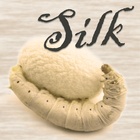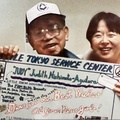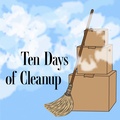Okei Ito hated mosquitos. In the California inaka, they seemed to swarm everywhere, breeding in water collected in surrounding ditches. In these same ditches, old miners, still fueled by the twenty-year-old dream of striking it rich, spent hours panning for gold.
She wasn’t used to all the mosquitos. She, like the other Wakamatsu colonists, were from northern Japan. Even in the middle of summer, it was cooler back home. Light rain would even fall at times. In contrast, the weather in Gold Hill was hot and dry. Those water-filled ditches, those were the culprits. If it weren’t for them, mosquitos would not be so plentiful.
Okei made sure to protect the two Schnell babies, her young charges, from any insects. The mother, Jou, was good at sewing and made mosquito nets out of cheesecloth for all of them, including Okei. Okei dismantled the bamboo trunks that they had brought from Japan and fashioned fans out of the materials. When she could, she would fan the babies to cool them down and also ward off the mosquitos.
Life in the colony was not easy, but Okei didn’t expect it to be. Everything in her young life had been marked by conflict. The Meiji warriors had destroyed her family and her home. Now she was responsible to help nurture two babies in a foreign land where she could not even speak the language.
To make matters worse, all was not well in the Schnell household. The leader of the colony, John Schnell, often yelled behind closed doors. His forceful personality was evident in public, too, but it was worse when he was only with his family, a family of all women.
Nothing they could do was quite right. He became especially irritated when the babies cried at night. One night he was in an especially foul mood. The colony’s farming enterprise was not doing well. His wife, Jou, took the younger one, Mary, and tried to nurse her, while Okei picked up the older one, Frances, and went outside to cradle her. It was cooler outside and Okei pointed to the stars in the skies, telling Frances stories of the celestials.
The stars had been Okei’s only consistent companion over these past few years. When her hometown was being destroyed by Meiji forces, Okei looked up at night, comforted by the moon and the constellations. And when she traveled to America on a boat, the dark water threatening to swallow her whole, she lifted her head. Up above were the same moon and stars that she had gazed upon in Aizu-Wakamatsu. And now, here in Gold Mountain, it was the same.
“Mite, Fransesu-chan.” Okei directed the baby to the sky and retold the story that she had heard from her own grandmother. There were two sisters carrying water in bamboo carriers. They found themselves in a great predicament. An ogre was chasing them and before they escaped to safety, he pulled off the foot of the younger sister.
“Me,” Okei pointed to her nose. “Nesan. The moon.” Frances’s thin eyes were now open. Okei then followed some stars in the sky with her index finger. “And the little sister is right there, still carrying two baskets of water with a bamboo pole. Her one foot is missing but hora, see the three stars in a line. That’s her leg.”
“So, if you ever need me, Fransesu-chan. Look up. I’m there in the moon.” Okei wasn’t quite sure what possessed her to say such a thing to an infant, but after she did it, she felt most relieved.
Okei did not have many friends. Since she was working for the master’s family, she was cautious around the other women and, truth be told, they were suspicious of her. Mr. Schnell had already warned her that if he discovered that she had revealed anything about his personal domestic life, she would have to pay the consequences.
The only person she could confide in was the gardener, Sakurai Ojisan. He was old enough to be her father. He didn’t say much about his background, but Okei knew that he had suffered like she did. “I get a feeling that Schnell may abandon me here,” she told him one afternoon in the garden in front of the house. “I’m even preparing the babies for my absence.” She shared with him the story that she had heard from her grandmother about the stars.
“Oh, I’ve heard of that one. Oyaninai boshi,” he said, balancing his weight on his hoe. He wiped off the sweat on his face and told Okei, “Meet me here tonight. After the Schnell family has gone to sleep.”
Loathe to insult her only friend, she agreed. But in the back of her mind, she was wondering why her presence was so desired later that night. Couldn’t he just tell her now?
Okei tried to put the babies down as soon as possible that evening, but Mary was especially fussy. For a while she even held Mary in her own bed to get her to sleep. Okei was so exhausted that she herself fell into a deep slumber and woke up to complete darkness.
Oh, Sakurai Ojisan, she thought! Carefully placing Mary in the rocker that one of the colony carpenters had made, Okei ran outside.
She didn’t expect him to be waiting for her so late, but there he was, gazing at the stars.
“There’s the little sister, right?” he said, pointing at the three stars in alignment.
“Hai,” Okei said.
“In America, they call it Orion’s belt.”
“Orion?” Okei had never heard of him.
“He’s a hunter,” Sakurai Ojisan explained. “Protector.” He then looked squarely at Okei’s face. “I am your Orion. No matter what happens, I will be here for you.”
Okei was incredibly touched; she was happy that it was so dark that he could not see the tears on her face. Then she felt a stabbing pain on her ankle. Another mosquito had bitten her.
(Author’s Note: The nonfiction sources used for this fictional creation included Daniel A. Métraux’s The Wakamatsu Tea and Silk Colony Farm and the Creation of Japanese America, Discover Nikkei articles, and Gary Noy’s Sierra Stories: Tales of Dreamers, Schemers, Bigots, and Rogues.)
© 2020 Naomi Hirahara





